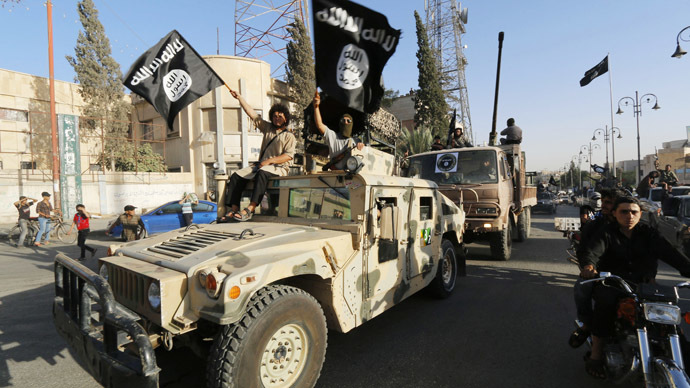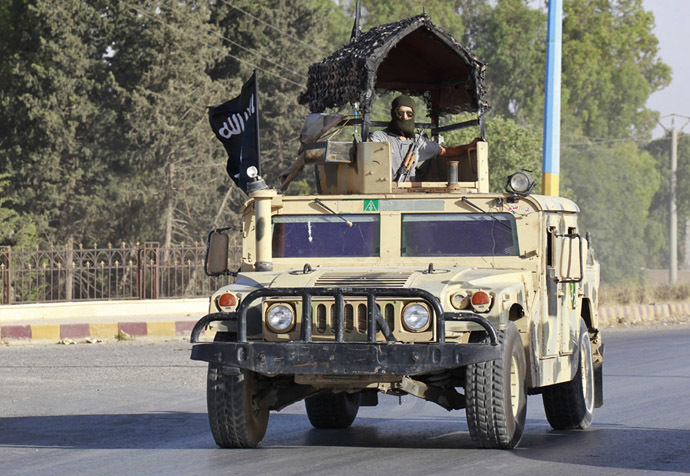‘US funded and trained jihadists in Syria – and now it wants to fight them’

The US is creating in Syria a perpetual state of war, funding jihadists on one side and then attacking them on the other, while the civilian casualties are just a part of the game, investigative reporter Ben Swann told RT.
RT:Washington says that the strikes are being carried out so that the oil facilities remain largely intact and can possibly be used again in the future. Given the weapons and missiles that are being used in this campaign, how likely is that?
Ben Swann: I think it is very difficult, and I think most viewers would agree, it is very difficult to target anything precisely through airstrikes. We refer to drone strikes as signature strikes and we know that drones wipe out a square block of space. So it is not a very definite signature. Look, whenever we talk about airstrikes we're talking about very large plots of land and very imprecise strikes. I think it would be extremely difficult for the US to be able to preserve oil fields while striking.
RT:The refineries that have been hit are now controlled by Islamic State. What is the impact of these attacks in the long run? Are the destroyed refineries much of a blow to the nation's economy?
BS: In the long term, it is going to have a very strong effect. I heard someone said yesterday that the administration should just come out and say what they are trying to do, which is go ahead and launch the strikes against Assad as well because that is what they are really there for. What I think is fascinating about this kind of geopolitical battle here is that the US has neither sought nor received approval, along with coalition partners to be in Syria conducting these strikes right now. It is a really fascinating kind of situation when you consider the [US] president stood up in front of the UN General Assembly yesterday and he talked about the importance of the rogue states not being able to just run roughshod over others and use the term “might” does not equal “right.” Well, I think in this case “might” is trying to make “right” for this coalition of partners and the US simply going into Syria and deciding they will conduct whatever war operations they choose to perform without even seeking the consent of the government.

RT:The Pentagon says that targeting oil facilities is the top priority right now, meanwhile, because of the recent Islamist militants’ advances we saw another wave of refugees and a number of villages seized. How come the protection of civilians comes second for the US?
BS: It really does not surprise me at all. The US, and there is plenty on the record to demonstrate on the record that the US, Turkey, Saudi Arabia and Qatar have all been financing these rebel forces that have then been turning and defecting to ISIS. And they have been doing this in Syria for about three years, over the last year we have seen a large number of defections to ISIS. That statement, the quote from the Iranian president, I think rings true that the US should at least acknowledge its role in this, having done this. So as a result of that and if we're not going to be honest who has funded these groups, how they've received their weapons and the fact that our president wants to continue to fight ISIS in Iraq and in Syria, but give additional money and weapons to the tune of $500 million, according to the US Congress, to the Free Syrian Army, we are creating a perpetual state of war. We'll fund them on one side and then we'll attack them on the other. And the truth is that civilian casualties are just a part of the game at this point.
RT:America is striking oil refineries controlled by Islamic State only in Syria, but the group also controls oil fields in Iraq. Why are those facilities not being targeted by Washington now?
BS: That is a great point. In fact, the numbers that come up show that the Islamic State is worth about $2 billion right now. Those estimates do not come from the oil fields that they control in Syria because right now those are sort of useless to them as well, because of the ongoing battle with the Syrian government. Instead, when you talk about those numbers, it is Iraq's Mosul oil fields that are being deemed as being valuable property to the Islamic State – and as you pointed out a minute ago, the US is not [planning] heavy air strikes on those northern Iraqi oil fields. Why that is? I think we can all speculate, but at this point it will be just speculation.
RT:Earlier, the UN unanimously passed a binding resolution to halt the flow of foreign jihadists to Syria and Iraq. What could be the next step from the international community?
BS: Well again, look, this is why this story is so difficult to talk about, because when we talk about the flow of money, when we talk about the flow of people, there are enormous numbers of people in the US, I would say millions of them who are fed up with the idea that the US government is sending fighters and money to train these rebels who are then turning and becoming ISIS fighters. Why are we going to create essentially sanctions against any country that sends fighters when we ourselves have been funding and supplying fighters? Senator Ron Paul has talked about it a bit in the US; that the US needs to step back and acknowledge the fact that we have funded these groups and given them the technological capability, money and fighters to be able to become the Islamic State. How are we going to create sanctions against other countries that would be sending fighters? It is upside-down when we talk about this issue.
The statements, views and opinions expressed in this column are solely those of the author and do not necessarily represent those of RT.
The statements, views and opinions expressed in this column are solely those of the author and do not necessarily represent those of RT.












